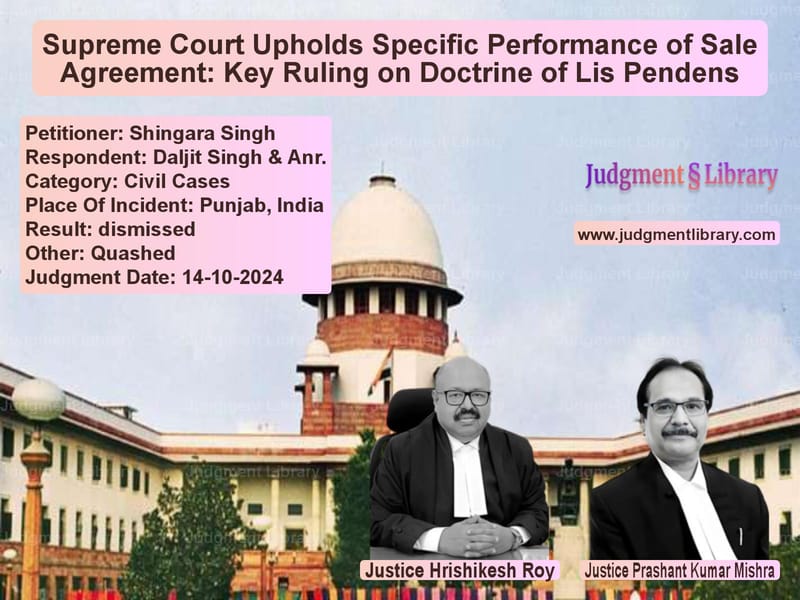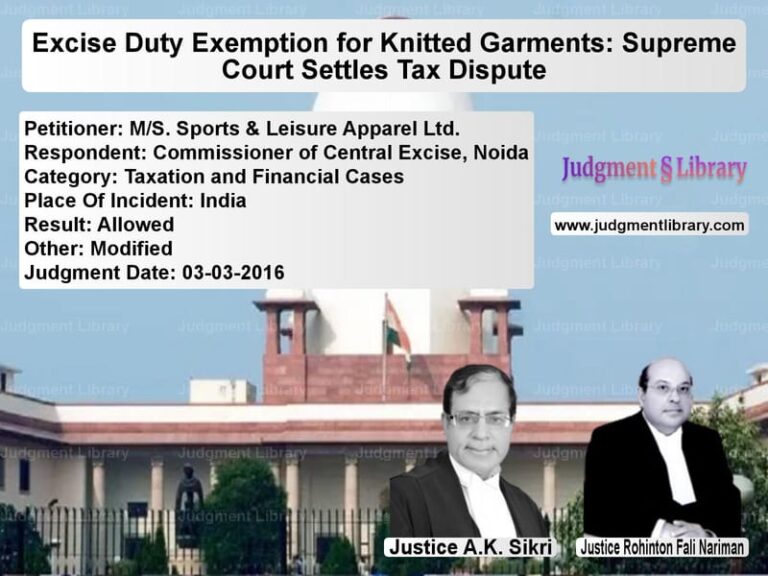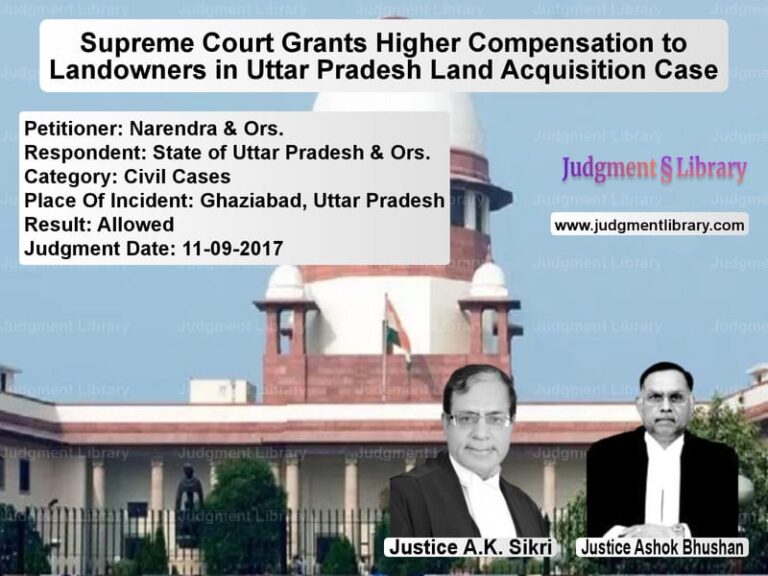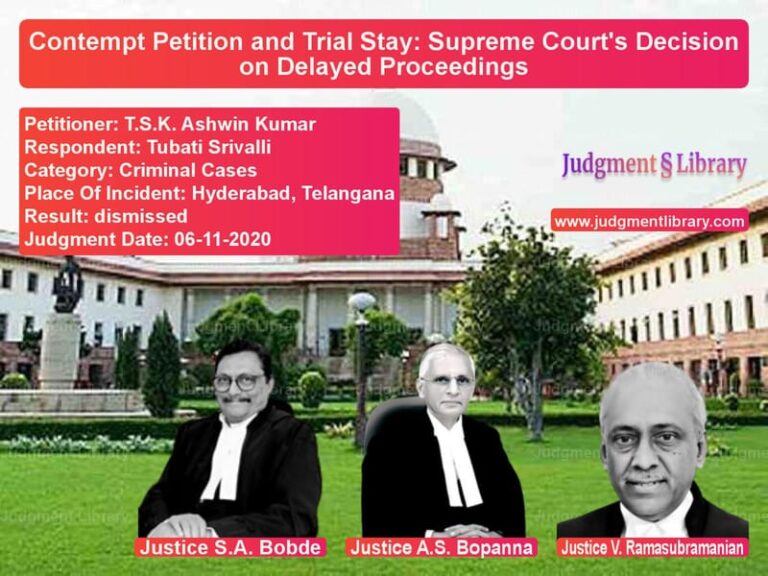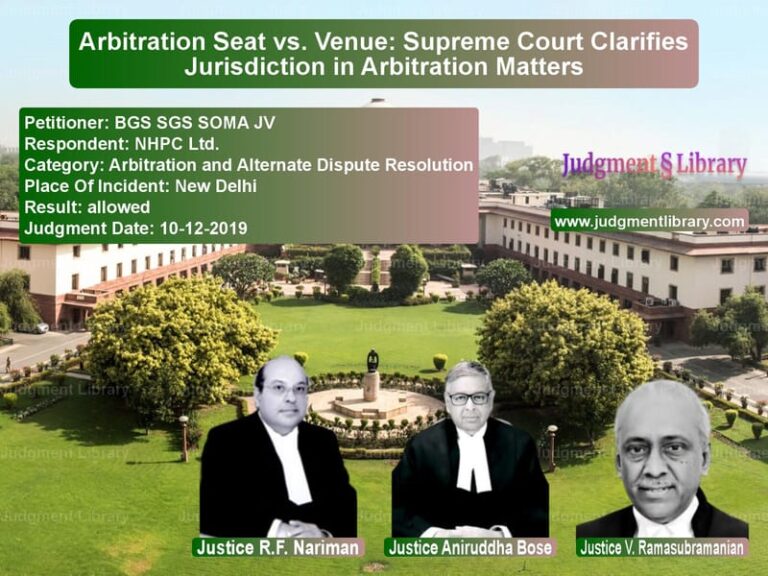Supreme Court Upholds Specific Performance of Sale Agreement: Key Ruling on Doctrine of Lis Pendens
The Supreme Court of India, in the case of Shingara Singh v. Daljit Singh & Anr., delivered a crucial judgment on October 14, 2024, affirming the doctrine of lis pendens and granting specific performance of a sale agreement. The case revolved around a dispute over land ownership and competing claims between the original buyer and a subsequent purchaser. The Court upheld the High Court’s ruling, reinforcing the principle that a purchaser of property during pending litigation cannot override the rights of an earlier buyer.
Background of the Case
The dispute arose when Daljit Singh (the plaintiff) entered into an agreement to purchase agricultural land from Janraj Singh (defendant no. 1) on August 17, 1990. The agreement stipulated that the total sale consideration was Rs. 80,000 per acre, and Daljit Singh had paid an earnest money deposit of Rs. 40,000. The balance amount was to be paid on or before November 30, 1992, at the time of execution and registration of the sale deed.
Daljit Singh claimed that he was present at the office of the Sub-Registrar on the agreed date with the balance sale amount, but the seller, Janraj Singh, failed to appear. As a result, Daljit Singh filed a suit for specific performance on December 24, 1992, within 23 days of the breach.
However, during the pendency of the suit, Shingara Singh (defendant no. 2) purchased the same property from Janraj Singh on January 8, 1993, by executing a registered sale deed. The sale was allegedly based on an earlier agreement between Shingara Singh and Janraj Singh dated November 19, 1990.
Trial Court and First Appellate Court Decisions
The Trial Court, in its judgment dated April 27, 2007, held that:
- The agreement to sell between Daljit Singh and Janraj Singh was legally valid and proved.
- The plaintiff was ready and willing to perform his part of the contract.
- However, since the property had already been sold to Shingara Singh, the plaintiff could not be granted specific performance.
- Instead, the court granted the plaintiff an alternative relief of refund of Rs. 40,000 with 12% interest per annum.
The First Appellate Court upheld the Trial Court’s decision, reasoning that Shingara Singh was a bona fide purchaser and had no knowledge of the previous agreement.
High Court’s Reversal
The Punjab and Haryana High Court overturned the lower court judgments and decreed specific performance in favor of Daljit Singh, ruling that:
- The sale in favor of Shingara Singh was hit by the doctrine of lis pendens under Section 52 of the Transfer of Property Act, 1882.
- Since the plaintiff had already filed a suit on December 24, 1992, and the sale to Shingara Singh occurred on January 8, 1993, the transaction was subject to pending litigation.
- Shingara Singh was not a bona fide purchaser as he belonged to the same village and was aware of the pending suit.
- The sale consideration paid by Shingara Singh was less than what was agreed upon in the plaintiff’s agreement, casting further doubts on its validity.
Petitioner’s Arguments (Shingara Singh)
Shingara Singh, through his counsel, argued:
- The High Court erred in reversing the concurrent findings of the Trial Court and First Appellate Court.
- Since the plaintiff’s agreement was with a close relative (Janraj Singh), the claim was collusive and fabricated.
- The doctrine of lis pendens should not apply as he had purchased the property in good faith and without knowledge of the previous agreement.
Respondent’s Arguments (Daljit Singh)
Daljit Singh countered:
- The Trial Court and First Appellate Court wrongly denied specific performance despite acknowledging the validity of the agreement.
- Shingara Singh had knowledge of the pending suit and thus could not claim the defense of a bona fide purchaser.
- The High Court correctly applied the doctrine of lis pendens to prevent the alienation of property during litigation.
Supreme Court’s Analysis and Judgment
Applicability of the Doctrine of Lis Pendens
The Supreme Court upheld the High Court’s application of the doctrine of lis pendens, stating:
“A purchaser of suit property during the pendency of litigation has no right to resist or obstruct execution of a decree passed by a competent court.”
The Court cited previous rulings, including Usha Sinha v. Dina Ram (2008), where it was held:
“A transfer made during a pending suit cannot defeat the rights of the plaintiff, and the transferee must abide by the outcome of the case.”
Rejection of Bona Fide Purchaser Claim
The Supreme Court dismissed the claim that Shingara Singh was a bona fide purchaser, holding that:
“The fact that both the seller (Janraj Singh) and the subsequent purchaser (Shingara Singh) were from the same village raises a presumption that he was aware of the pending dispute.”
Granting of Specific Performance
The Court reaffirmed that the plaintiff had always been ready and willing to perform his contractual obligations. It ruled:
“Mere execution of a subsequent sale deed does not defeat the rights of the original buyer if the agreement is valid and enforceable.”
Key Takeaways from the Judgment
- Strengthening Property Rights: The ruling reinforces that an earlier agreement to sell takes precedence over subsequent transactions.
- Importance of Due Diligence: Buyers must ensure they are not acquiring disputed property to avoid legal consequences.
- Fairness in Contract Enforcement: Courts will protect the rights of parties who have entered into valid agreements in good faith.
- Lis Pendens Doctrine: Transactions made during pending litigation are always subject to the court’s final decision.
Conclusion
The Supreme Court’s ruling in Shingara Singh v. Daljit Singh is a landmark decision in property law and the doctrine of lis pendens. By granting specific performance, the Court reaffirmed the primacy of valid agreements and the importance of fair dealing in property transactions. This judgment will serve as a strong deterrent against fraudulent property transactions during litigation and ensures that rightful buyers are protected under the law.
Petitioner Name: Shingara Singh.Respondent Name: Daljit Singh & Anr..Judgment By: Justice Hrishikesh Roy, Justice Prashant Kumar Mishra.Place Of Incident: Punjab, India.Judgment Date: 14-10-2024.
Don’t miss out on the full details! Download the complete judgment in PDF format below and gain valuable insights instantly!
Download Judgment: shingara-singh-vs-daljit-singh-&-anr.-supreme-court-of-india-judgment-dated-14-10-2024.pdf
Directly Download Judgment: Directly download this Judgment
See all petitions in Property Disputes
See all petitions in Contract Disputes
See all petitions in Specific Performance
See all petitions in Damages and Compensation
See all petitions in Landlord-Tenant Disputes
See all petitions in Judgment by Hrishikesh Roy
See all petitions in Judgment by Prashant Kumar Mishra
See all petitions in dismissed
See all petitions in Quashed
See all petitions in supreme court of India judgments October 2024
See all petitions in 2024 judgments
See all posts in Civil Cases Category
See all allowed petitions in Civil Cases Category
See all Dismissed petitions in Civil Cases Category
See all partially allowed petitions in Civil Cases Category

